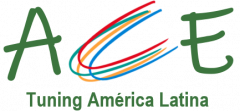LINE 1: Creating International Reference Points to Guide and Inspire Programme Revision and Enhancement Processes
1. Regional Subject-Specific Qualifications Reference Frameworks
ACE Regional Subject-Specific Qualifications Reference Frameworks show which elements of the graduate profile are considered to be the most important by students, graduates, employers, academics and other key actors in the South American region. The (re)design of each student-centered programme/curriculum begins by defining the desired graduate profile the progamme aims to help students achieve, by answering the following questions: What responsibilities do you want people who successfully complete the programme to be prepared to assume? What skills are students expected to be able to demonstrate once they finish their studies or even before finishing their degree (in order to later assume the responsibilities key for the desired graduate profile)? What knowledge do students need to acquire and learn to apply throughout or before finishing their degree?
In the Student-Centered Approach, answering these questions well is essential, since the answers will guide the entire process of curricular (re)design, as well as all decisions related to learning, assessment, and teaching. Based on these responses, programme learning outcomes are formulated. The international relevance and recognition of a study programme is also determined by the decisions made in this phase of curricular (re)design.
The Reference Frameworks that have been created in the ACE project are the result of discussions between and consultations with multiple stakeholders from different South American countries about what is expected of a future graduate as a professional and responsible citizen, about what is valued and about the elements of the graduate profile whose presence will facilitate recognition of degrees, mobility and employment of graduates. They also represent the diversity and richness of views that exist in South America within each of the subject areas addressed in the ACE project.
Four Regional Subject-Specific Qualifications Reference Frameworks have been created: one for Education, one for Environmental Studies, one for History, and one for Nursing. They can be consulted below, together with their explanatory texts (all in Spanish). Their purpose is to guide and inspire the revision of curricula in the four subject areas – these reference documents are to be used by higher education institutions that want to improve their programmes in one or more of the four subject areas, and/or for quality and accreditation agencies that seek international references that can facilitate recognition, promote internationalisation and improve the quality of higher education programmes.
- South American Qualifications Reference Framework for undergraduate programmes in the Subject Area of Education
- South American Qualifications Reference Framework for undergraduate programmes in the Subject Area of Nursing
- South American Qualifications Reference Framework for undergraduate programmes in the Subject Area of History
- South American Qualifications Reference Framework for undergraduate programmes in the Subject Area of Environmental Studies
2. Repositories of good practices in student-centred teaching, learning and assessment
While the Reference Frameworks are tools that can guide and inspire the revision of graduate profiles and the revision or formulation of programme learning outcomes at a career/curriculum level, the Repositories of Good Practices in Student-Centres Teaching, Learning and Assessment are intended to guide and inspire revisions of the assessment, learning and teaching processes, once the learning outcomes that students need to achieve are clear.
The Frameworks invite you to identify elements to include or reinforce in the desired graduate profile so that it responds to what you want graduates to be able to demonstrate – the expectations of society and the labour market at a national and international level. They allow us to give a better answer to the question: what do our students need to learn?
The Repositories suggest some possible answers to the following questions:
- How can what students need to learn be learned? (learning activities)
- How can teachers and students know if students have achieved the desired goals or are moving in the right direction? (assessment)
- What learning and teaching activities can enable students to progress towards these goals? (learning and teaching activities)
- What do we need to take into account if we want our assessment, learning and teaching activities to be based on the key principles of the Student-Centered Approach?
The good practice examples included in the Repositories have been chosen by students and academics who have worked on the ACE project to inspire more and more teachers and higher education programmes to adopt the Student-Centered Approach. The four Repositories created (in Spanish) can be consulted through the following links:
- Repository of good practices in student-centred teaching, learning and assessment f0r programmes in the subject area of EDUCATION
- Repository of good practices in student-centred teaching, learning and assessment f0r programmes in the subject area of ENVIRONMENTAL STUDIES
- Repository of good practices in student-centred teaching, learning and assessment f0r programmes in the subject area of HISTORY
- Repository of good practices in student-centred teaching, learning and assessment f0r programmes in the subject area of NURSING
